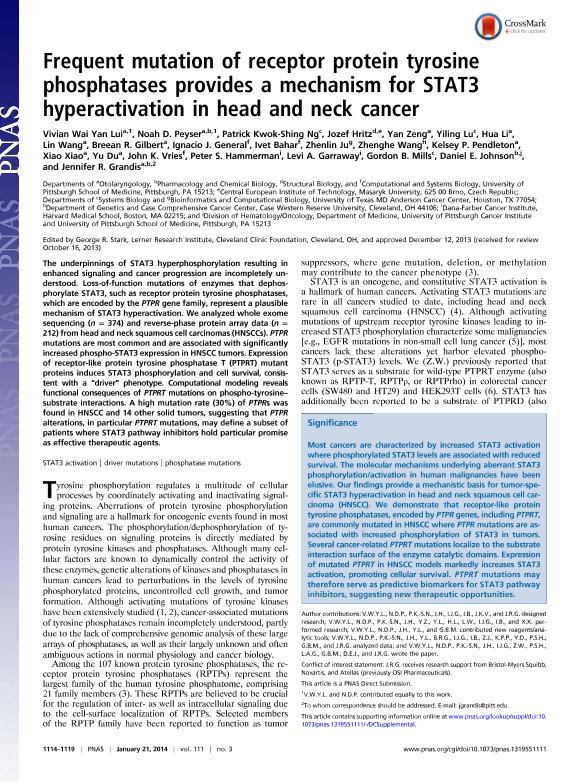Artículo
Frequent mutation of receptor protein tyrosine phosphatases provides a mechanism for STAT3 hyperactivation in head and neck cancer
Lui, Vivian Wai Yan; Peyser, Noah D.; Ng, Patrick Kwok-Shing; Hritz, Jozef; Zeng, Yan; Lu, Yiling; Li, Hua; Wang, Lin; Gilbert, Breean R.; General, Ignacio ; Bahar, Ivet; Ju, Zhenlin; Wang, Zhenghe; Pendleton, Kelsey P.; Xiao, Xiao; Du, Yu; Vries, John K.; Hammerman, Peter S.; Garraway, Levi A.; Mills, Gordon B.; Johnson, Daniel E.; Grandis, Jennifer R.
; Bahar, Ivet; Ju, Zhenlin; Wang, Zhenghe; Pendleton, Kelsey P.; Xiao, Xiao; Du, Yu; Vries, John K.; Hammerman, Peter S.; Garraway, Levi A.; Mills, Gordon B.; Johnson, Daniel E.; Grandis, Jennifer R.
 ; Bahar, Ivet; Ju, Zhenlin; Wang, Zhenghe; Pendleton, Kelsey P.; Xiao, Xiao; Du, Yu; Vries, John K.; Hammerman, Peter S.; Garraway, Levi A.; Mills, Gordon B.; Johnson, Daniel E.; Grandis, Jennifer R.
; Bahar, Ivet; Ju, Zhenlin; Wang, Zhenghe; Pendleton, Kelsey P.; Xiao, Xiao; Du, Yu; Vries, John K.; Hammerman, Peter S.; Garraway, Levi A.; Mills, Gordon B.; Johnson, Daniel E.; Grandis, Jennifer R.
Fecha de publicación:
01/2014
Editorial:
National Academy of Sciences
Revista:
Proceedings of the National Academy of Sciences of The United States of America
ISSN:
0027-8424
Idioma:
Inglés
Tipo de recurso:
Artículo publicado
Clasificación temática:
Resumen
The underpinnings of STAT3 hyperphosphorylation resulting in enhanced signaling and cancer progression are incompletely understood. Loss-of-function mutations of enzymes that dephosphorylate STAT3, such as receptor protein tyrosine phosphatases, which are encoded by the PTPR gene family, represent a plausible mechanism of STAT3 hyperactivation. We analyzed whole exome sequencing (n = 374) and reverse-phase protein array data (n = 212) from head and neck squamous cell carcinomas (HNSCCs). PTPR mutations are most common and are associated with significantly increased phospho-STAT3 expression in HNSCC tumors. Expression of receptor-like protein tyrosine phosphatase T (PTPRT) mutant proteins induces STAT3 phosphorylation and cell survival, consistent with a “driver” phenotype. Computational modeling reveals functional consequences of PTPRT mutations on phospho-tyrosine–substrate interactions. A high mutation rate (30%) of PTPRs was found in HNSCC and 14 other solid tumors, suggesting that PTPR alterations, in particular PTPRT mutations, may define a subset of patients where STAT3 pathway inhibitors hold particular promise as effective therapeutic agents.
Palabras clave:
DRIVER MUTATIONS
,
PHOSPHATASE MUTATIONS
,
STAT3 ACTIVATION
Archivos asociados
Licencia
Identificadores
Colecciones
Articulos(SEDE CENTRAL)
Articulos de SEDE CENTRAL
Articulos de SEDE CENTRAL
Citación
Lui, Vivian Wai Yan; Peyser, Noah D.; Ng, Patrick Kwok-Shing; Hritz, Jozef; Zeng, Yan; et al.; Frequent mutation of receptor protein tyrosine phosphatases provides a mechanism for STAT3 hyperactivation in head and neck cancer; National Academy of Sciences; Proceedings of the National Academy of Sciences of The United States of America; 111; 3; 1-2014; 1114-1119
Compartir
Altmétricas



